

|
Back to |
| The Front Page |
| People |
|
National Croquet Center is Steuber's rich legacy by Bob Alman layout by Reuben Edwards photos by Bob Alman, Joe Camosy and the National Croquet Center Posted September 1, 2008 |
||||||
|
||||||
|
|
||||||
Chuck Steuber's death at his home in Boca Raton comes almost eight years after a severely debilitating stroke left him unable to actively manage the remarkable enterprise that is his legacy - the 10-acre Charles P. Steuber National Croquet Center in West Palm Beach, Florida. Although the membership club was established when the lawns were playable in late 2000, and many major events were held on its twelve lawns over the next two years, the Center was not fully operational until the clubhouse was completed in May of 2002. Under six different generations of management in as many years, the Center has yet to achieve financial self-sufficiency, while dedicated donors continue to preserve the legacy of its founder, who spent millions of his own personal fortune to make it happen, against all odds.
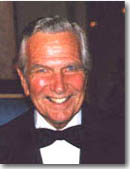
|
| Charles P. Steuber |
When Steuber became the fifth president of the Croquet Foundation of America - in the late 90's - it was at a time when the USCA's difficulties in finding a secure headquarters combining court and office space were recognized as a major and ongoing problem. It was only natural that Stueber would want to solve this problem by creating an American headquarters for the sport unrivaled in its size and magnficence anywhere in the world. No longer would the Association and the Croquet Foundation of America be at the mercy of landlords where croquet was a very small part of a huge resort operation.
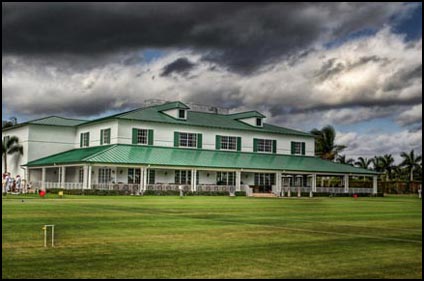
|
| Joe Camosy's prize-winning photo of the Charles P. Steuber National Croquet Center displays a resplendent clubhouse under hurricane-prone skies. |
He enjoyed being the ultimate authority in the entire process, from the beginning, and personally involved himself in all the major decisions. He chose the site of the Center, he was there when the bulldozers came, he hired the architect and the interior designer and could not be dissuaded from including elegant and expensive elements in that design as well as a ballroom for 250 that added considerably to the cost of the building through the additional code requirements for second-floor halls of that kind. He approved every detail of the club structure and dues I drafted for him to review, along with the croquet director, Archie Peck. He approved and bankrolled the first Golf Croquet World Championship to be held at the Center, in February 2002 - the event that announced the Center as the new "croquet mecca."

|
| In February of 2000, feeding trash wood into the grinder was the last step before construction of the 12 lawns could begin by hauling in many tons of sand to raise the elevation of the site by a couple of feet. |
Steuber was confident of the future of the Center, because he was going to be completely responsible for making it happen and making it work. When the Center was planned, he was healthy and vigorous, though approaching 80. When without warning he suffered a severely debilitating stroke in late 2001, little more than half a year before the clubhouse was to be completed and the finished Center opened, the personal tragedy also dealt a devastating blow to the Center. No longer would absolute financial and managerial authority rest in one person's responsible hands.
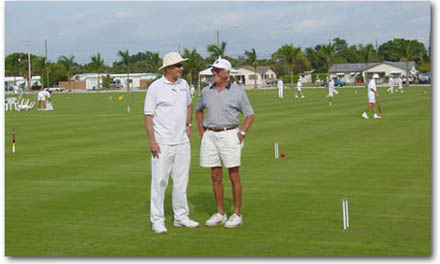
|
| On December 2, 2000, the lawns opened with two events, under the supervision of Bob Alman and Director of Croquet Archie Peck (right), to much excitement in the croquet community and rave reviews in the local press. |
In the care of his family, in Boca Raton - about 30 miles south of the Center - Steuber heroically tried to carry on his life as usual, refusing to sit in the wheelchair that his condition made not quite mandatory, insisting on walking upright with a cane, even with almost no strength in his afflicted right side. As it turned out, he outlived his beloved wife, Peg, by a couple of years and lasted almost eight years after the stroke.
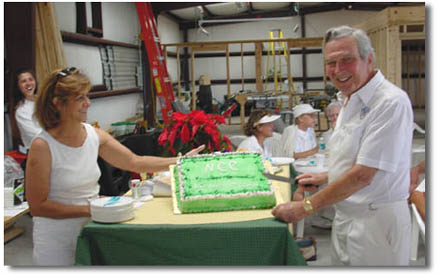
|
| Chuck Steuber celebrated the "soft opening" in December 2000 with Shereen Hayes, USCA office manager, in the huge maintenance building that was soon to house the offices of Alman and Peck on one end and the USCA staff on the other, while the clubhouse was being completed. |
Given Steuber's personal integrity and strength of will, it is easy to imagine that the Center would be in excellent financial health today if only the financial and managerial accountability had remained in the hands of the one capable individual who created it. No one person is to be blamed for the organizational chaos that followed Steuber's stroke, and most observers in the croquet world are content to simply hope that these affairs will settle themselves out over time. In fact, many in the croquet community have made major financial contributions to that effort. And many individuals continue to donate their time and energies in roles ranging from part-time to full-time unpaid volunteers, to keep Steuber's croquet showcase up and running.
The owners of the facility - the Croquet Foundation of America - have seen a constant shifting of authority and responsibility among their board and officers. In a depressed post Nine-Eleven hospitality market amidst widespread rumors that the Center was going bankrupt, the prospects for the survival of the Center when the clubhouse opened in May of 2002 was not good, and that public knowledge severely affected the management's ability to sell events to corporations and private parties.
Despite those rumors and the obvious financial difficulties, membership in the club was growing and enthusiastic in 2001, 2002, and 2003, with volunteers shouldering much of the work that was to be done by professional staff in later, more prosperous circumstances. I organized the club and managed its development until July 2003, leaving the Center in the care of a committee of volunteer, unpaid, offsite managers, while the onsite caterer helped to keep the enterprise in a growing mode by personally investing in the marketing of events.
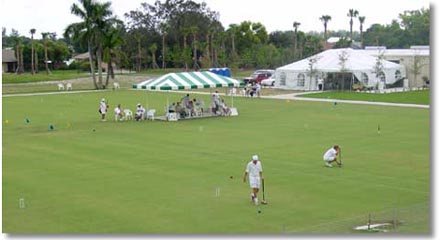
|
| By October 2001, the National Croquet Center was a fully functioning first-rate croquet venue - the largest in the world - but still lacking a clubhouse. This photo from the second floor of the uncompleted clubhouse shows how major events were run in that period - including the Solomon Trophy matches and the first USCA national championships to be held there. In the background is the maintenance shed, fronted by the "Festival Tent" that served for catering, meetings, and shelter from the occasional shower. |
In early 2004, John Curington, current president of the Croquet Foundation of America, arranged with the Steuber family the gifting of the considerable debt owed to him, which enabled the Foundation to finally borrow development capital with the Center as unencumbered collateral. In 2004, a professional manager was hired, and that manager had sufficient money to spend on long-deferred but essential investments in development, including specialized staff for marketing and promotion.
However, this manager, at first hailed as "the savior of the Center," left in acrimony after his one-year term expired, and a series of short-lived managers followed, each of them failing to provide professional business development expertise needed to achieve financial self-sufficiency for the world's largest croquet club and at the same time oversee the continued development of the event business.
The current manager (in August 2008) is a volunteer, unpaid, part-time manager who has made some significant contributions to the Center's organizational structure, but who has been unable to develop the membership club sufficiently to approach the much-desired and elusive break-even point.

|
| The Charles P. Steuber National Croquet Center in 2008 operates as many enterprises in one location. This USCA headquarters facility hosts many national and international events, including the World Championships of croquet in May of 2009. Also in residence is the Pro Shop, the event marketing staff, and the resident caterer, Sandy James, operating the Croquet Grill. The Center is most respendent when large, elaborate corporate parties are held there. These events may include meetings in the upstairs ballroom, dining downstairs on the wide wrap-around veranda and in transparent tenting connecting to t he clubhouse, and hundreds of party-goers playing casual Golf Croquet on as many as 24 half-courts. |
Within the croquet establishment, given the history of disappointed expectations from half a dozen generations of management in as many years, there is not a great deal of optimism that the Center can soon achieve economic self-sufficiency. At the same time, there is a widespread conviction among the croquet establishment that this magnificent Center must be preserved at all costs, after so much investment in its creation and maintenance. One Palm Beach stalwart told me, "We simply won't allow this Center to be lost to the sport."
Some notable efforts had already been made, before Steuber's time, to secure a suitable headquarters facility for the sport in America. In the late nineties, John Curington had come close to making a breakthrough agreement with the city of West Palm Beach for a multi-court facility in the city's centrally located Howard Park, near the Convention Center, but the proposal was finally voted down by City Council because, they said, the croquet activity would have been too overpowering a presence in this central location.
It's possible that this well-publicized near-miss spurred Chuck Steuber's determination to create a headquarters facility. Curington was the initial Project Manager at the Center site, overseeing the building of the 12 lawns, which were playable a full year and a half before the Clubhouse was completed following a series of expensive delays.
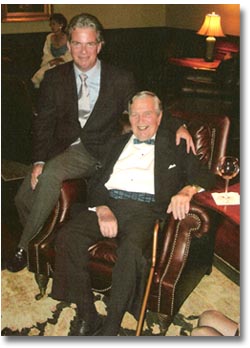
|
| Chuck & Charlie Steuber |
Rich Curtis, president of the US Croquet Association, said of him: "His vision, tireless efforts and generosity made the dream of the National Croquet Center a reality and in so doing, he significantly advanced the presence of croquet in America. All croquet players in the United States are indebted to Chuck and his life will continue to be celebrated by each of us each time we have the privilege of competing on the lawns of the NCC."
|
THE EDITOR'S PERSONAL ASSESSMENT
OF THE MAN AND HIS CROQUET LEGACY
Chuck Steuber's personality profile does not fit - at all - what one would expect of a self-made millionaire. He was too generous and openhearted, too trusting, and displayed far too much humility - which, as I observed many times, was genuine. In my first long meeting with him - in early 2000, after I had heard the astonishing news of his intentions and then flew to Florida to offer my assistance - I questioned him casually about his career. I asked how he had amassed all that money. He replied, without apparent thought or hesitation, "I was lucky, it was all an accident." Of his breakthrough contributions to the chemical tanking industry, he told me that he had first proposed the idea to his employer - Union Carbide - and only when they clearly weren't interested did he pursue investors for the project on his own and form the company that was almost an overnight success. Later he described to me another bit of "good luck" - making millions by buying and later selling Home Depot stock at exactly the right time. "I was just lucky," he told me. A big part of that good fortune, he told me, was persuading his hometown sweetheart to marry him. "I would never have made it without her," he told me. (His wife Peg died at their Boca home in 2006.) Up to his 80th year, he seemed to have lived a charmed life. Such a person, with such a strong sense of personal integrity, must surely have been deeply religious. But no. Chuck Steuber was profoundly distrustful of organized religions and all other schemes that delivered paid-up packaged philosophies to devout adherents. He wanted to think for himself, he said. His own distinctly secular memorial service - at his club in Boca Raton - was described by his family as "A Celebration of Life." Steuber enjoyed exercising total authority in the project to build and develop the National Croquet Center, and he had the money to back up all his decisions. Although his management style was unbelievably loose, there was nothing casual about it. When I moved to Florida to organize the club and manage its development, I asked him what my title should be, and he replied, "Whatever you think it should be." I decided that "Director of Marketing, Development, and Community Affairs" would be the most useful description to put on the business card I would hand out by the thousands in those formative years of circulating throughout Palm Beach County to publicize the new Center. It's useless to declare, now, that the Center would be financially successful today if not for the debilitating stroke that took him out of the picture, practically speaking, in the fall of 2001 - the same season in which the Nine-Eleven disaster plunged the South Florida hospitality industry into a two-year recession, with disastrous financial consequences to the local economy and to the National Croquet Center. But the fact is that since Steuber's stroke, there has never a time since when financial and managerial accountability for the Center resided within one individual with the intelligence, will, and resources to make the enterprise succeed. Often, in discussing the critical issues involving cooperation with the other croquet entities, he would comment on the character and expertise of some of the principal players in the croquet establishment, the people who had attained office and therefore could not be ignored. "I know the guy is second-rate," he once commented of one especially inept personality with a title, "but for now, we can't ignore him. Don't worry about it. I'll handle it." And he did - until he had the stroke. He would attend the obligatory meetings, he would listen patiently....and then he would call or meet with me and we would decide what was to be done. Chuck Stueber was slow to anger but quick to let it go when the moment passed. He hated confrontation. On two occasions when I was reported to have done something really bad, he didn't trust himself to speak to me about it - instead, he wrote me letters. One one occasion, I apologized, because I had done the wrong thing, and I knew it; another time, I had simply replaced the bullshit with accurate facts, which were accepted. In both cases, the matters were closed. His perceived faults provide the most powerful testimony to the strength of his character. He was too quick to action, too trusting of people; he really wanted to believe whatever they told him. I often heard the complaint, "He agrees with the last person he talked to about it!" Early in the history of the National Croquet Center, on the basis of a single phone call from a man whose proposal I had turned down for good financial reasons, Chuck made a financial commitment that would be costly and yield no benefit. When I found out about it, I called Chuck, who related to me various inaccurate statements made to him, on the basis of which he had made the financial commitment. After I had provided the demonstrably accurate facts, Chuck would still not rescind the agreement. No papers had been signed, no legal contract formed: But he was unwilling to go back on his word, even after he acknowledged that he had given his word on the basis of inaccurate information. Faulting him for being true to his word would be unfair, so I simply requested that he never again make a commitment bearing on my responsibilities in managing the National Croquet Club without checking with me first. He gave me his word, and he kept it. Chuck Steuber lived by his word, the mark of an honorable man. That kind of integrity is not merely a badge of honor. He said it was all good luck, but I believe that living your life around the principle of giving and keeping your word - every time - is as solid a foundation for a good life as you can find in any religion or philosophy, or for that matter, any school of business. I won't try to prove it, and Chuck would have objected to any suggestion of "karma," but I believe it had something to do with creating what Chuck always described as his extraordinarily "good luck." I believe Chuck Stueber made his own good luck. His friends, his family, and the croquet community have all enjoyed the great good fortune of Chuck Steuber. - Bob Alman, Founding Editor, Croquet World Online Magazine
|